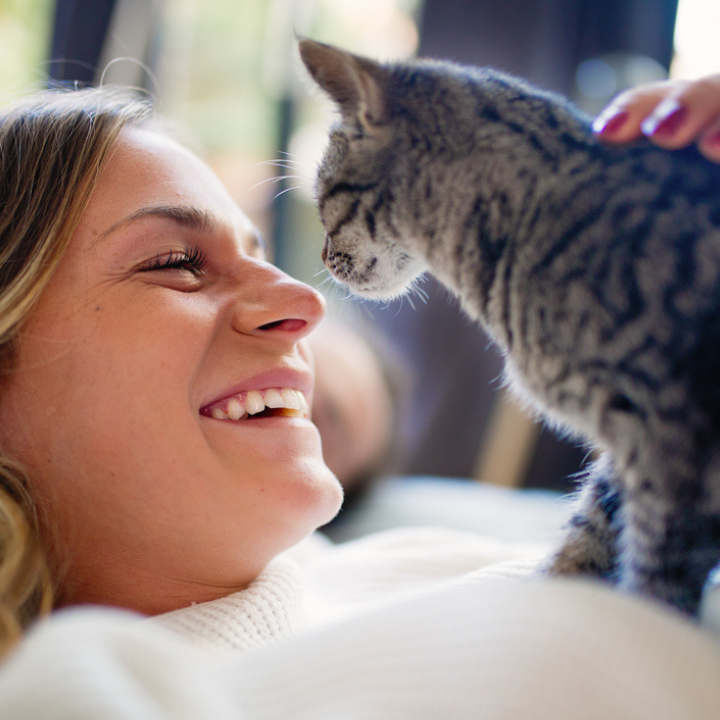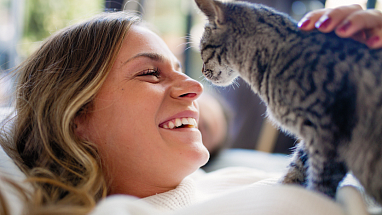Successful aging doesn’t just mean adding years to your life. It also means adding life to your years – being able to do the activities you value for as long as you can. And that depends on keeping your physical, cognitive and mental health in good form.
As the proportion of older adults in the population continues to grow, the concept of successful aging has gotten more attention, including a focus on the role pets might play. Pets encourage us to get up and move; they make us laugh, provide comfort and offer affection. They can even help us meet new friends and get to know our neighbors. In fact, multiple research studies show that sharing our lives with pets can provide a host of physical, social and emotional benefits for all ages, including older adults.
Here’s a look at just a few of the evidence-based perks pets provide for healthy aging:
Pets may reduce social isolation and loneliness, improve mental health
We know loneliness can be detrimental to our health – reported as being as harmful as smoking 15 cigarettes a day. We also know that social isolation had ached epidemic levels well before the pandemic. Further, some studies(Opens a new window) have found social distancing due to the pandemic may have disproportionately impacted aging adults, many of whom were already suffering from loneliness and social isolation.
Now, here’s the good news:
- According to recent U.S. market research by HABRI in collaboration with Mars Petcare, 80% of pet owners say their pet makes them feel less lonely.
- Nearly 89% of those who got a pet because they were lonely felt their pet helped them feel less lonely.
- Meanwhile, a quarter of all pet parents surveyed said they got a pet to improve their mental health(Opens a new window).
- In the group of people aged 55 and older, more than half said they did so for the mental health benefits.
At Mars Petcare, we’re committed to better understanding the human-animal bond through science and how it can help address societal challenges, like social isolation and loneliness. Toward that end, we support rigorous research(Opens a new window) – using high quality standardized measures – about the physical, cognitive, developmental and emotional benefits of human-animal interactions. These findings can inform policies and enable access to animal-assisted interventions for those who may benefit most.
Some eye-opening examples of research results:
- An international(Opens a new window) study conducted in collaboration with our Waltham Petcare Science Institute, which found pet owners experienced stronger neighborhood connections and were consistently more likely to report social benefits, like helpfulness, friendliness and trust between neighbors.
- A study of homebound seniors(Opens a new window), which found those who owned pets were better at paying attention, remembering details and learning from past experiences than those who didn’t.
- Pets have also been found to improve mental wellbeing by reducing feelings of depression(Opens a new window).
Pets can also be good for your heart health
Pet ownership, particularly dog ownership, is associated with a lower risk of cardiovascular disease and better overall heart health:
- A recent longitudinal Waltham-funded study in 2022(Opens a new window) looked at how pet ownership might maintain physical function in healthy aging. It concluded that while physical function did decline with age, it was observed to be less severe among pet owners in overall physical performance.
- A 2019 study(Opens a new window) took a closer look at the physical effects of dog ownership (particularly dog walking) on older adults. It showed that owning a dog has a demonstrably positive effect on their humans’ overall exercise levels (even beyond dog walking) – a recommended part of any healthy lifestyle.
- Research published in the American Heart Association’s medical journal found an association between dog ownership and owners’ lower mortality risk. One of the studies(Opens a new window) shows dog owners living alone had a 33% lower risk of dying after suffering a heart attack, and a 27% lower risk of dying following a stroke, compared to non-owners.
- A systematic review(Opens a new window) of existing studies, published in the same journal, also found that dog owners were 24% less likely to die for any reason, and 31% less likely to die from a cardiovascular problem.
- This clinical trial(Opens a new window) found adults with pets have healthier responses to stress, including significantly lower heart rate and blood pressure levels, with lower reactivity to stress and faster recovery.
- Research has also found that older adults who owned dogs or cats in the past were less likely to become frail over a two year period(Opens a new window) than people who had never owned those pets.
Things to consider before adopting a pet for the senior in your life
A word of caution: It’s never a good idea to choose a pet for someone else. Talk to your relative and other family members or caregivers to explore the feasibility of adding a pet to their lives. Work with your loved one to research the kind of pet that will work with their personal needs, living situation, budget and schedule.
Even if owning a pet isn’t possible, older adults can still enjoy the company of animals by fostering, volunteering at local shelters, pet sitting, and even raising puppies until they’re old enough to begin formal guide/service dog training.
Here’s to more snuggles, walks, purrs, pets and wags!
There’s still so much left to discover about the magic animals bring to our lives(Opens a new window). But studies like these help advance our understanding of the many ways our furry friends can help keep us younger as we age – and we love them for it!















